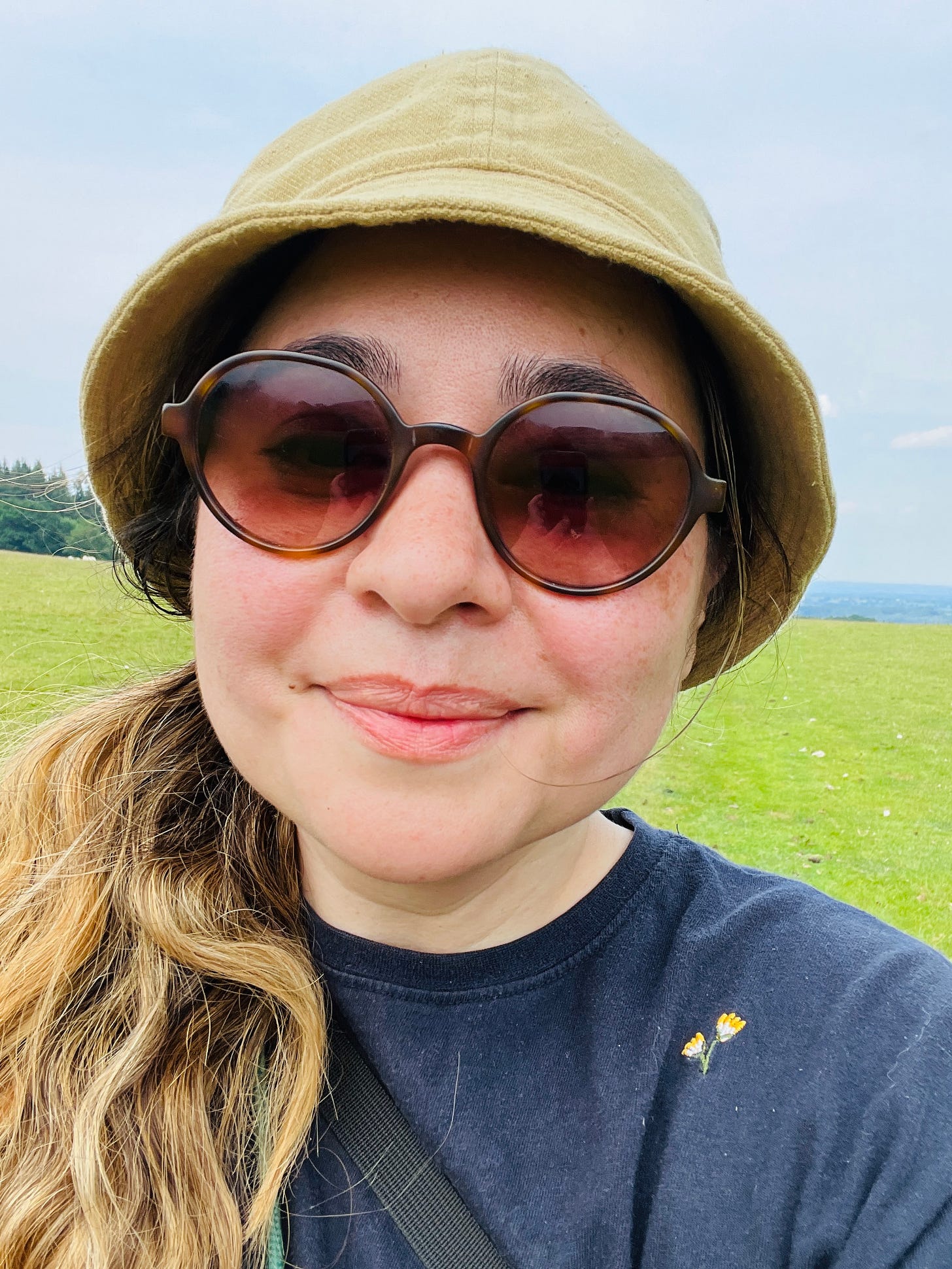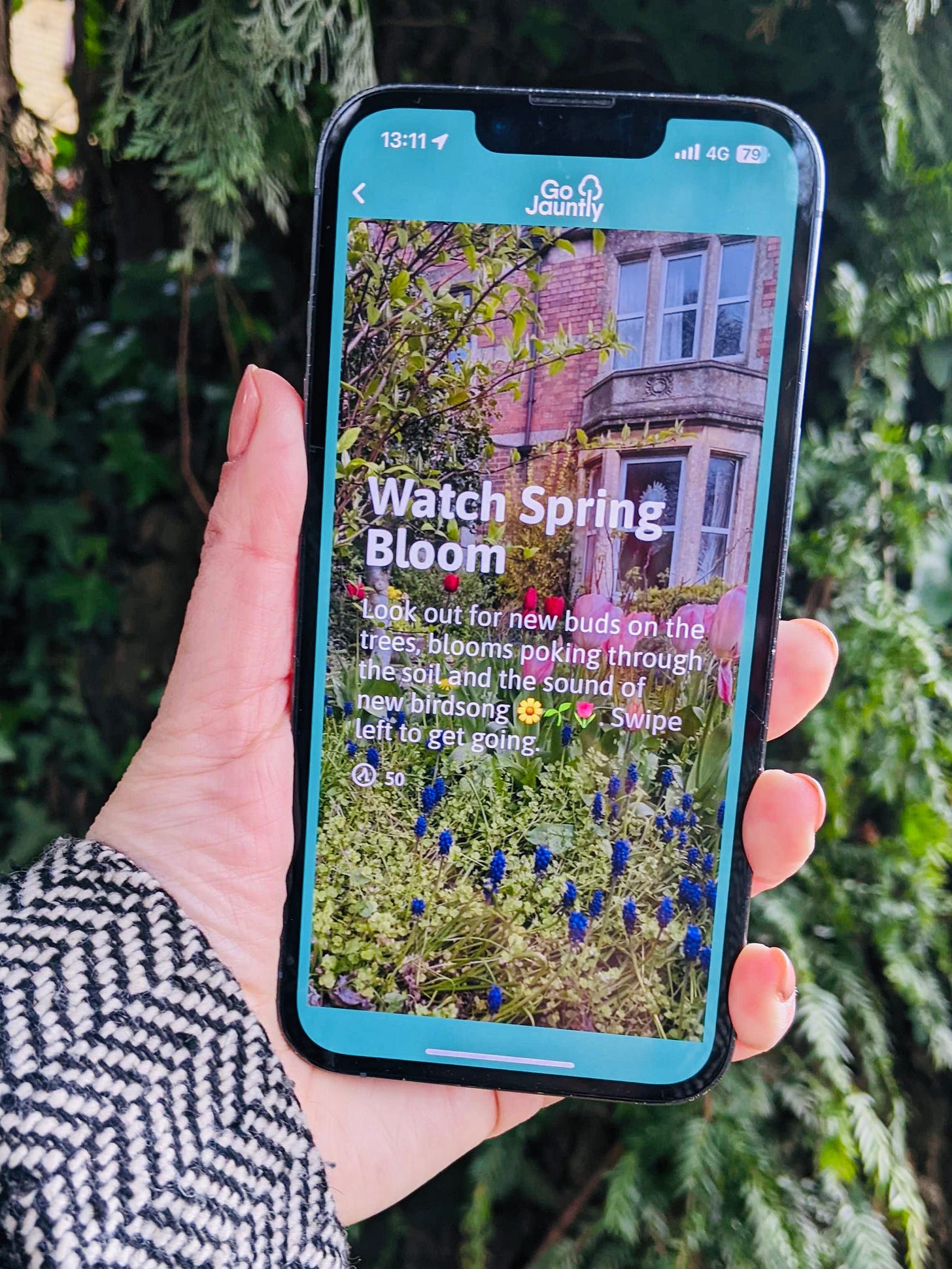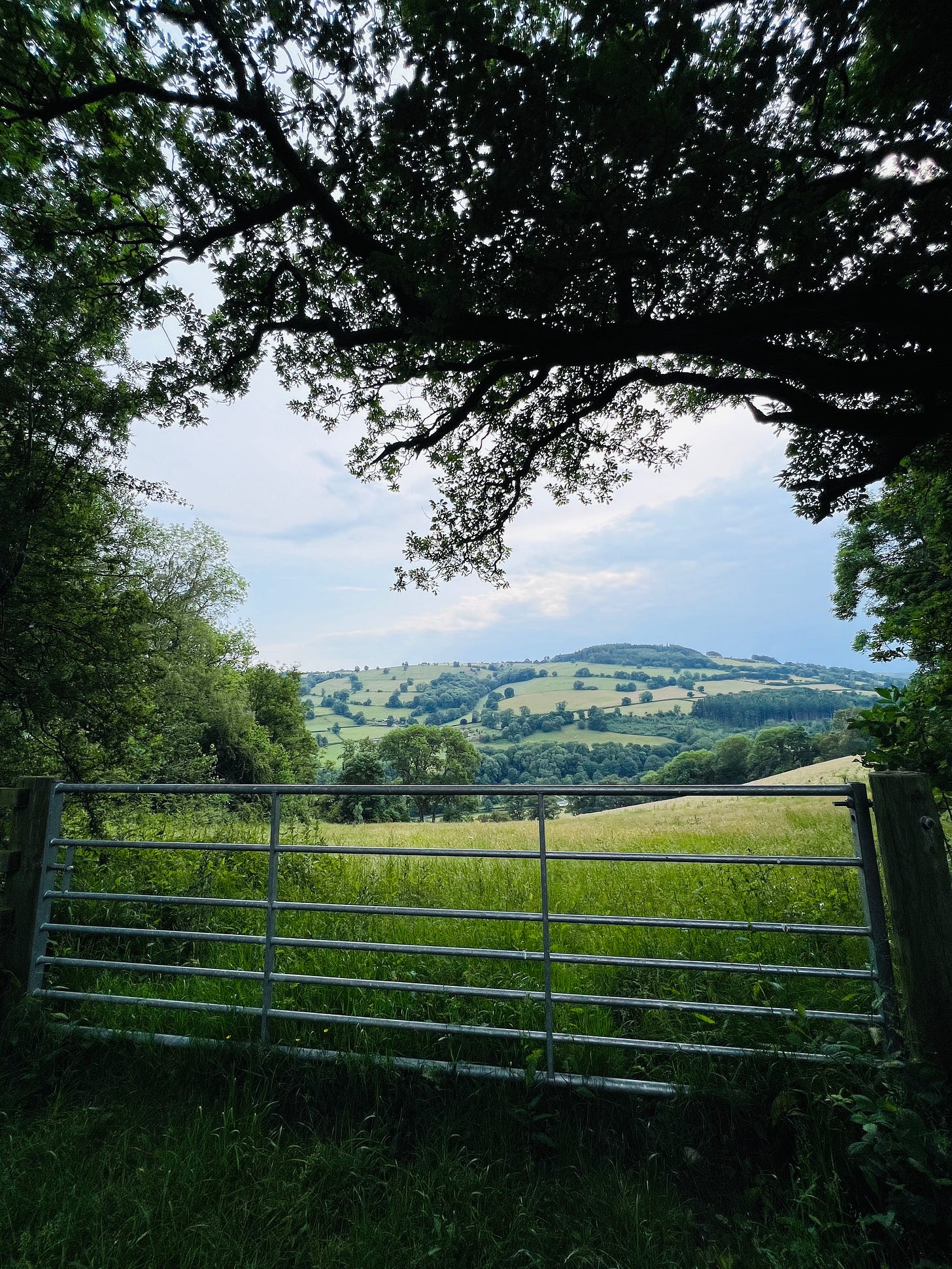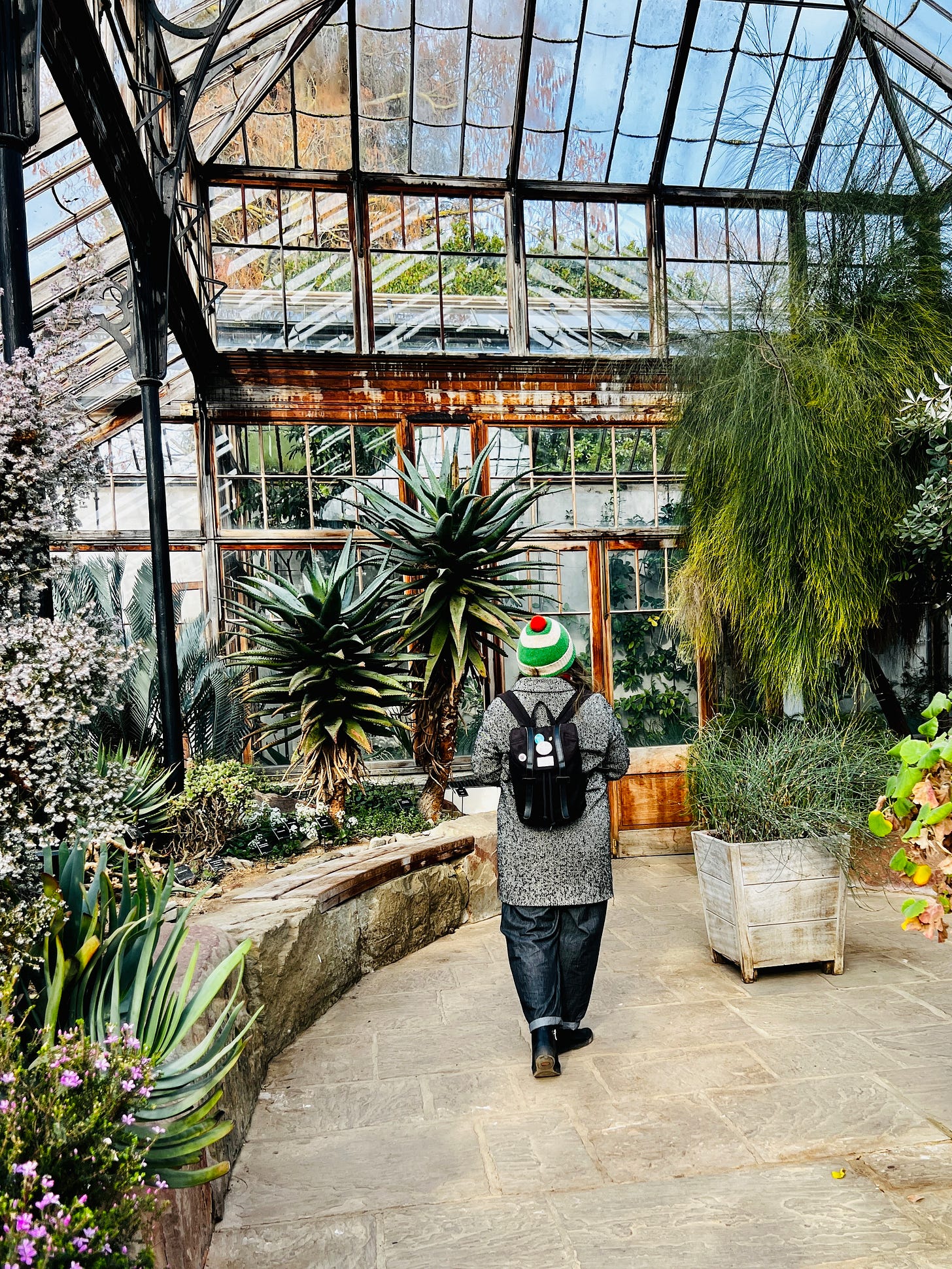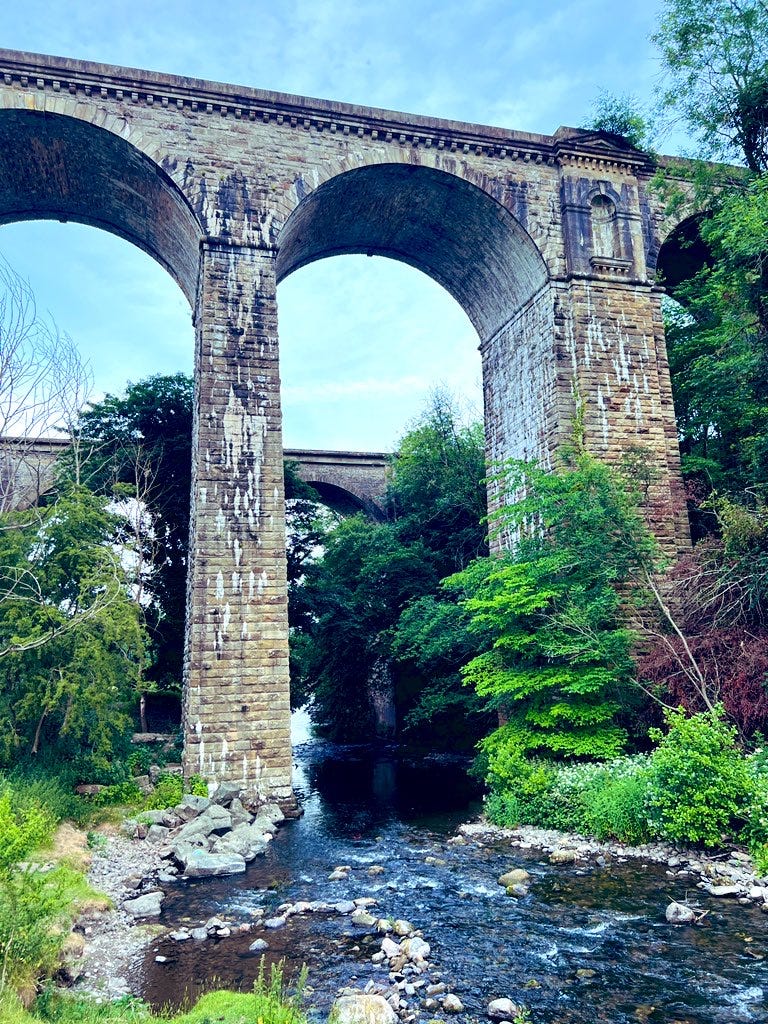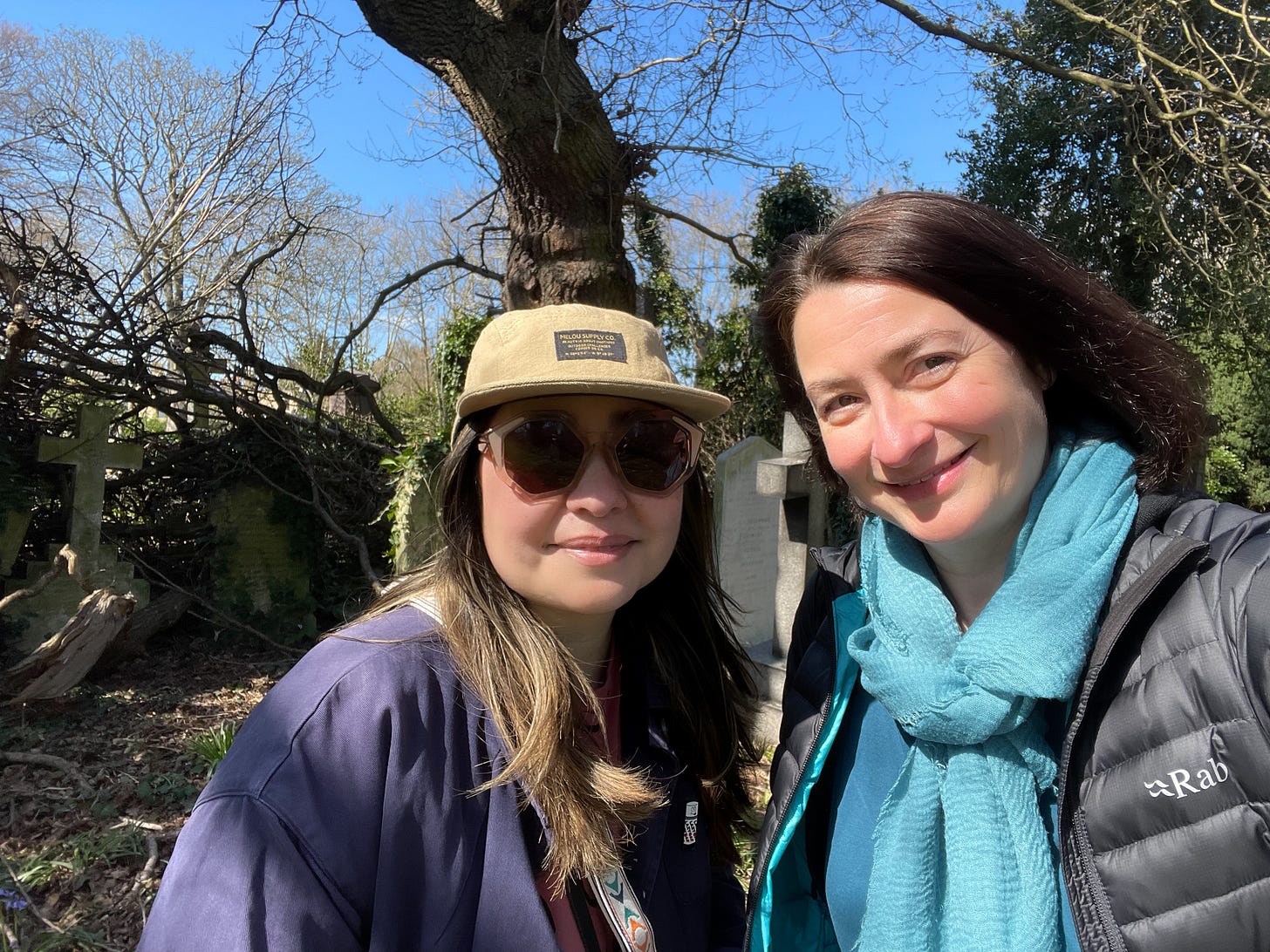Walking with Hana Sutch, Co-founder of Go Jauntly
The walking app creator who’s helping to break down barriers and improve access to green space
“Access to green space isn’t equitable. Women, people of colour, people with health conditions, kids, and people from low socio-economic backgrounds are the least likely to access nature – but would benefit the most.”
That’s what Hana Sutch has discovered through walking. And it’s these challenges to access, and the realisation that she rarely sees someone who looks like her when she’s on a leisure walk, that motivated her to do something about it.
Hana is the co-founder and CEO at Go Jauntly, a multi award-winning walking, wayfinding and nature connection app.
As desk-bound London city-dwellers she and her co-founders yearned to be a bit more active – without resorting to the gym. When they saw how hard it was to find walks and trails in familiar, local places – especially with young families – they decided to do something about that by creating a walking app.
Like Hana, I’m not a fan of the gym, so I knew we already had that in common – together with our love of walking and desire to share that with others. I’m also inspired by how she’s raising awareness of the challenges to accessing green space, and love what she’s building with Go Jauntly. So we met for a wander and she told me all about her love of walking. I’m really honoured to share her story with you here.
Hi Hana, thanks for chatting with me. Please introduce yourself.
Hi! I’m Hana Sutch, co-founder and CEO at Go Jauntly, the multi award-winning walking, wayfinding and nature connection app. I live in South East London with my family and our crazy-fun cockapoo.
I have a design and tech background and worked agency-side for most of my early career and delivered massive digital projects for the likes of Xbox, Nike, Science Museum and more.
My connection to nature (and love of walking) definitely developed later on in life and really blossomed after I had a kid. It was really important to me that they grew up with a good connection with the natural world, despite living in the big smoke.
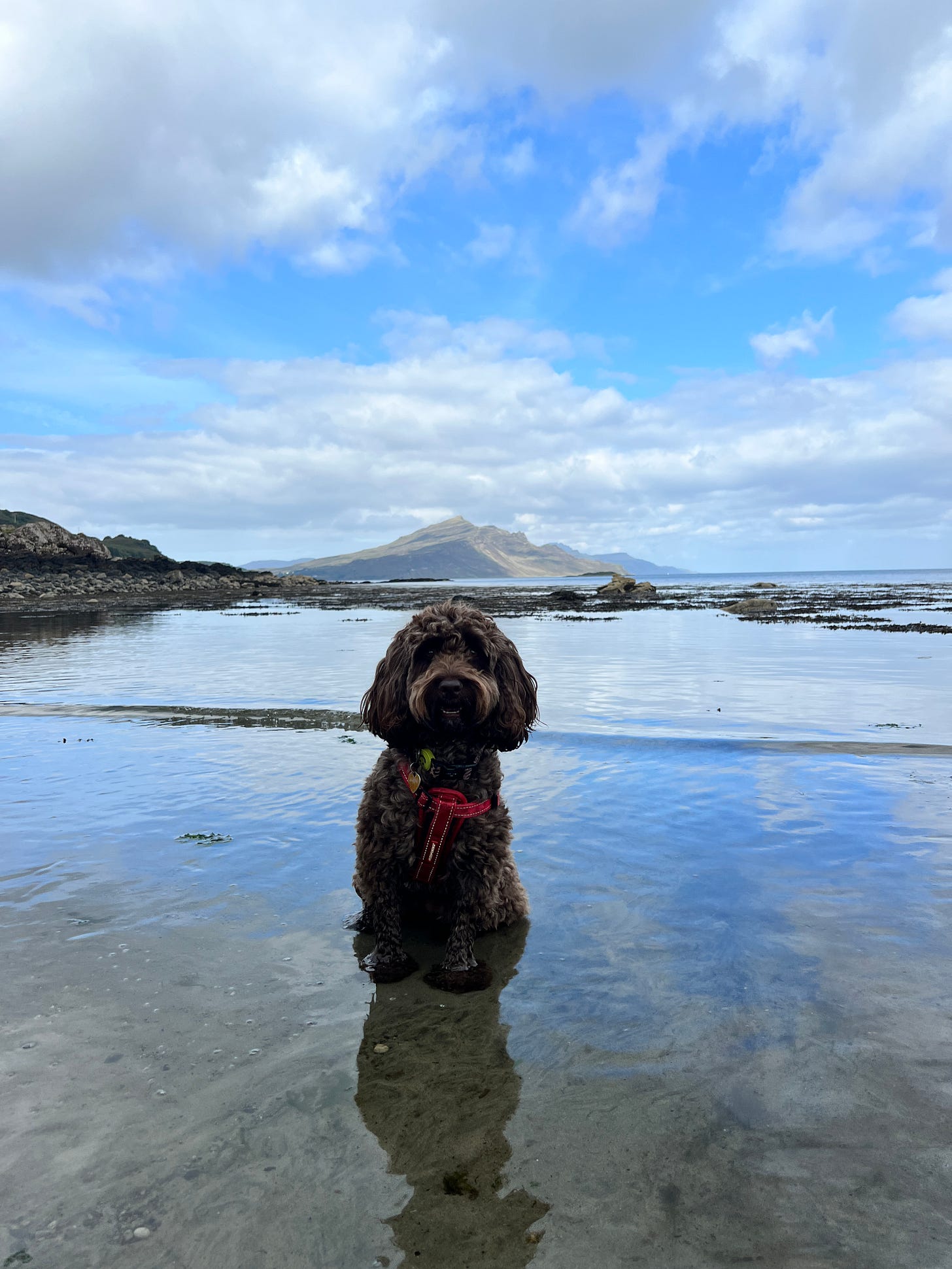
You co-founded Go Jauntly, in 2016. What motivated you to create it?
The app was born out of a frustration of not being able to find nice places to go for a walk despite living in London which is actually 47% green space! Getting out into nature is often associated with ‘the great outdoors’ which is inaccessible to so many people. Access to green space isn’t equitable. Women, people of colour, people with health conditions, kids, and people from low socio-economic backgrounds are the least likely to access nature – but would benefit the most. I really wanted to do what I could to break down the barriers to walking, like not knowing where to go, whether there were loos onsite, how muddy it was, what the walk looked like, or where to walk. Most of the existing apps were targeted at the already fit, trad white male hill-hiker types and not at people like me.
“I see very few people that look like me on my leisure walks. I’m of mixed heritage and I think I’ve seen about 10 people who look similar to me in the last 10 years. There’s so much more work needed for diversity in the outdoors.”
What’s been the most fun about creating a walking app?
I’ve got to travel a lot! Especially across the UK. Quite often we curate brand new walking routes for our clients and partners which means not only some initial desk research but literal boots on ground, surveying and groundtruthing the routes. We get to trial the routes ourselves and whilst sometimes the routes are no good due to things like badly maintained paths, on the whole it’s been a really fun and positive experience. Then seeing people out and about enjoying the routes we’ve created after they’ve gone out ‘into the wild’ is amazing. We try to make really great walks. Ones that feature a bit of everything from good local cafes or pubs to pretty gardens and streets through to sweeping vistas. And we mustn’t forget the loos, we always need the loos!
And what hurdles did you have to overcome?
Ah, so many hurdles. We’re bootstrapped so we aren’t backed with VC money. It’s been a lot of hard graft. Blood, sweat, tears or broken ankles (on a client walk!).
“Most of the existing apps were targeted at the already fit, trad white male hill-hiker types and not at people like me.”
What obstacles to walking do people face these days?
The billionaire tech bros have a lot to answer for on so many levels. The attention economy has stolen our freedom to be well-rested, bored, inspired, creative, at ease. Doomscrolling news and social media has made the few very rich and the masses poorer for it in so many ways. More unhealthy, more sedentary, more isolated, less happy, less active and worse off all round. I know it might be weird for a tech founder with an app to say this but it’s true.
We’re so reliant on cars, people don’t realise that it’s 9 to 12 times more polluted inside a car compared to outside a car and that those 5-minute journeys you make in a car could be walked in 25 mins or less. Domestic transport emissions accounted for 29% of our greenhouse gas (GHG) emissions in 2023. One way to be more active and more sustainable is to ditch the car for short trips.
For me, being a walker isn’t about climbing hills or visiting national parks – it’s about building more walking trips into your everyday life. It’s a great way to connect with the natural world, it’s good for you physically and mentally. Start small like I did. 10 mins here, 10 mins there and give it a few years you’ll be walking 20 miles over two days like I accidentally did a few weeks ago for work.
“Studies led by the University of Derby’s Nature Connectedness Research Group (NCRG) found that using a smartphone app to prompt people to notice the good things in urban nature not only increased their connection with nature, but brought key wellbeing benefits to users.”
“The more connected to nature you are, the more likely you are to want to preserve it, which is essential in the fight against climate breakdown and biodiversity loss.”
Your background is in tech and digital design. How do you think tech can support, or enhance people’s experience of walking and nature?
Go Jauntly is an enabler. It helps you find walks on the go and new walks in your neighbourhood or further afield. Occasionally, some people say that they don’t need a phone to go on a walk and I’m like, great, I’m really happy for you but lots of people don’t have your confidence. They can’t read a map, they aren’t confident of their surroundings or they don’t know where to walk. This is where we step in. People can preview our walks in advance, check out the photo-led guides, head to the destination and then pop their phone in their pocket and only get it out when they need guidance or more inspiration.
Our app is not designed to keep you at home, with endless scrolling/watching videos from dubious influencers or advertisers but designed to get you out and about and enjoying nature. One of our hypotheses at the start was if we can get more people to walk for leisure then they’ll be more likely to walk for active travel. A recent poll of 3,000 app users on our leisure walks showed that nearly 90% agreed that they now walk more for active travel as a result of Go Jauntly. That is a massive win for us as walking is good for people and the planet.
What has Go Jauntly taught you about walking and people’s relationship with it?
What I didn’t fully understand when I was in the early days of Go Jauntly is…
How much good walking infrastructure affects your feelings about walking. If the paths are flat, there are no barriers, it’s green/nature-filled, you see other people like you walking, the propensity to walk is so much higher.
How few people that look like me I’ve seen on my leisure walks. I’m of mixed heritage and I think I’ve seen about 10 people who look similar to me out and about on leisure walks in the last 10 years. There’s so much more work needed for diversity in the outdoors.
Not only am I trying to get people to download my walking app, I’m trying to get people who don’t walk, to walk more! This is the only way to make true social impact and promote behavior change and it is a massive task that I completely underestimated.
“For me, being a walker isn’t about climbing hills or visiting national parks – it’s about building more walking trips into your everyday life.”
You partnered with the Nature Connectedness Research Group at the University of Derby to create a research app that would measure the impact of noticing urban nature on mental health. What did you learn from that?
The Nature Notes feature was developed as part of the £1.3m Improving Wellbeing Through Urban Nature project. Studies led by the University of Derby’s Nature Connectedness Research Group (NCRG) found that using a smartphone app to prompt people to notice the good things in urban nature not only increased their connection with nature, but brought key wellbeing benefits to users. Crucially, the research found it brought clinically significant improvements in quality of life for people living with a mental health difficulty.
We learnt about the pathways to nature connectedness which informs a lot of our work:
Contact through the senses.
Emotions (relating to awe and relaxation).
Appreciation of nature’s beauty.
Finding meaning in nature.
Displays of compassion for nature.
Nature Notes is a bit like a nature diary or journal to capture the good things you see in everyday nature. Daily prompts remind you to notice the natural world and can be used as a tool to help you self-manage mental health and wellbeing. It’s really simple to use:
Take a moment to pause and notice the good things in nature.
It could be as simple as noticing a bird singing or the colours and movement of a tree in the breeze - and the joy and calm it brings.
When you're ready, write a short note in the app about a good thing you noticed in nature. You can include a picture if you like.
Doing this everyday for a week can provide a month's wellbeing benefit.
Nature Notes can be used within your home or garden or as part of your local walks and outdoor adventures.
The amazing thing about nature connection is the more connected to nature you are, the more likely you are to want to preserve it, which is essential in the fight against climate breakdown and biodiversity loss.
“Nature Notes is a bit like a nature diary or journal to capture the good things you see in everyday nature. Daily prompts remind you to notice the natural world and can be used as a tool to help you self-manage mental health and wellbeing.”
Other than inspiring Go Jauntly, what role does walking play in your work as a digital product and service designer?
Walking helps keep me sane. It’s something that is really easy to fit into my crazy busy lifestyle. I am always spinning lots of plates and sadly I am a bit of a workaholic. One day I will be a recovering workaholic and be able to walk a lot more but for now it’s mainly my mental health prop and a place for new ideas. Lots of ideas pop into my head whilst walking, which helps me a lot, as sometimes when you’re chained to the desk, creativity is stifled. I think every walk should be joyful, so I always try to walk the ‘Green Route’ from A to B – to the shops or pharmacy, etc. – every walk should be pleasurable. The 'Green Routes' feature on Go Jauntly is one of my favourites. It helps you walk the leafiest, greenest and least polluted way to and from any location in the UK and Ireland. It's perfect for avoiding busy and polluted streets and getting an extra dose of nature in.
What’s your walking style?
Daily jaunter.
Headphones on or head in the clouds?
A bit of both! Some days, a rage walk might need some music blasting and other days a calm, slow walk where I tune into the birdsong is a must.
“Lots of ideas pop into my head whilst walking, which helps me a lot, as sometimes when you’re chained to the desk, creativity is stifled.”
What’s your most memorable walk?
The best walk I’ve ever done was in Chirk, Wrexham. It was my first solo hike and it was only a couple of years ago. It was 6 miles which is the furthest distance in one go for me as well. I did it with my dodgy ankle and I had the best time. I was so anxious beforehand. I was worried about being solo, about the unknown, whether I’d make it all the way around but it was fine. More than fine! Previously I was more into shorter walks, ones that I could do with my kid but now I have an urge to do a long distance walk. Now that I know I can do it, I want more.
The Chirk walk is available for free on the Go Jauntly app.
If you could take a walk with anyone, real or fictional, alive or gone, who would it be?
I would like to go for a walk with Audre Lorde. I’m reading Sister Outsider: Essays and Speeches at the moment and she is such an incredible woman and her words really stand the test of time for me. She was/is so on point with her observations of society, racism, sexism, patriarchy and capitalism. She was so prescient and it’s kind of shocking to read now in the light of the rise of fascism and billionaire tech bros mimicking feudalism, and I think a walk with her would be enlightening.
“It is not our differences that divide us. It is our inability to recognize, accept, and celebrate those differences.”
Audre Lorde, Sister Outsider
One word round
One thing you always take with you on a walk?
Water (and my phone!)One word to describe how walking makes you feel?
WholesomeOne word to describe how you feel about creating tech for good?
Duty
Finally, please can you share a nature observation or journalling prompt for our readers?
Head out for a walk and note down 3 good things you see in nature. Why are they good? How does it make you feel? What good thing could you do for nature in return?
Thanks for chatting with me, Hana, and for sharing the story behind Go Jauntly, the access challenges that so many people face, and the wellbeing benefits of being more connected with nature.
To find out more, and to try Nature Notes for yourself, you can download the Go Jauntly app for free on iOS or Android. The Nature Notes feature is available on iOS only.
Happy walking and writing until next time,
Sarah
More from The Writer’s Walk
If you enjoyed hearing Hana’s story, you might also enjoy reading about Jen Lowthrop – another entrepreneur who’s championing the benefits of nature and walking.


